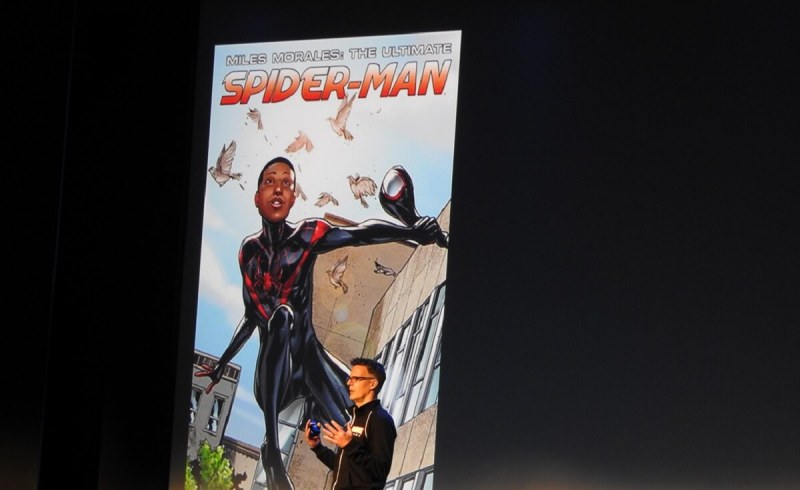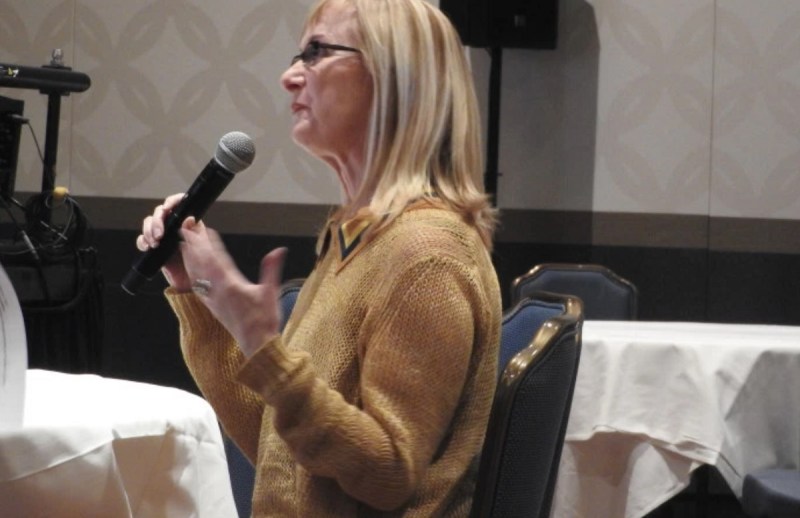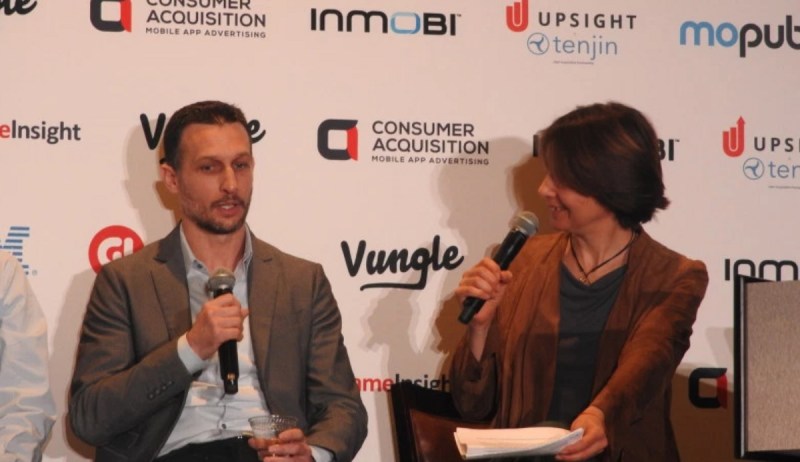
Above: Bill Rosemann shows one of the diverse reimaginings of Spider-Man.
Lazzaro: I’d like the panel, and the audience as well, imagine you have a young friend who’s just started doing something similar to you, maybe in another organization. What kinds of tips, books, resources would you recommend to them to lead from a more diverse perspective, something different from the old way of leading?
Dieterle: We’ve been going through something that Insomniac, really trying to focus on our leadership and how we can effect positive change. One of the tips that’s resonated with everyone is, give people the benefit of the doubt. When we all meet for the first time, we have unconscious bias. No matter who you are, you’re going to make a snap judgment based on the person in front of you. You have no idea who that person is. So even when you’re interacting in business, give the other person the benefit of the doubt. If you listen, if you are compassionate, you might actually learn something.
Ramer: There’s a notion that you should seek to understand before being understood. That’s where part of the difference shows up — being present to what’s being said and who you’re with. Being able to calm yourself enough to listen to what you’re hearing and appreciate what people are saying. And letting them know that they’ve been heard. That’s the most critical thing.
Fries: When I meet with younger managers, I often say that the most important thing you do is hiring. The things you do well in hiring, or the mistakes you make in hiring, you live with them for years to come. And so hiring is critical. It’s easy, when you’re trying to fill a position, to be impatient. You see a candidate and you know they’re not meeting your bar. You meet another one and another one, and after a while the bar starts to drift down. Maybe it’s me? Maybe I’m too picky?
Especially when you’re talking about diversity, you’re trying to create this balance within your team. Not only do you want a great whatever, but you want someone who will help fill out the balance of your team. You have to be patient. When you find that great candidate, they stand out. That’s what I remind myself. Wait until you’re stunned by a candidate, and then you know you have the right person.
Dieterle: I often hear that someone’s not a fit, not a cultural fit. When I hear that I stop people right then and say, “That’s exactly the person you need to hire.” We sit here and we build an infrastructure of sameness. If you can understand — from a cultural standpoint within an organization, you change with every person that enters your company and every person that leaves your company. You become more diverse and more open to ideas if someone isn’t a cultural fit.
Fries: I just read this big study from Carnegie Mellon. They’ve done a great job bringing up the diversity of their computer science program over the last decade. What was interesting about that, they said that specifically they did not focus on gender. They focused on culture, changing the culture of their computer science community. They didn’t use the word “diversity.” They used the word “balance.” I love that. They went to a more accepting culture.
An example of what they did is they found that if they offered computer science along with biology, they would get a different set of students applying, because they had people who just wanted to do computer stuff for its own sake, but there were also people who wanted to apply computers to something that was interesting to them. That led them to reach a broader group of people.
What struck me when I read this — they said they specifically didn’t focus on gender so much as culture. It reminded me of the early days of the games business, where we said, “Well, we need to make games for girls, so we’ll make all these very pink games.” But why I said I feel optimistic, why I think we’ve made progress — now I feel like we can make games for everyone. Something like Overwatch is a game that has characters that anybody can relate to. You can find someone there that fits. Or even just something like Candy Crush. Can we make games that work for everyone?
Look at the latest Star Wars. The cast is diverse, but is that the story, that they have a diverse cast? No, it’s just a great piece of entertainment. I bet if you look at the people who made it, that was a diverse group as well.

Above: You have a lot of big guns in Sunset Overdrive.
Lazzaro: I love the idea of focusing on culture, but how do you break that down, so it’s not just — all right, we have the culture check box? What steps do we take? How can we operationalize this?
Dieterle: I’ll talk a bit about Sunset Overdrive. That was a really interesting opportunity, where we made a conscious decision that you get to choose. You get to choose your body type. You get to choose your race. You get to choose what you wear.
When you talk about how you effect change, what I would say to you in your businesses, you want to be able to speak up. It’s a challenge. Right now we’re working on a different game, and those same questions come up, but I would say we as a gaming community have an opportunity to build that diversity into what we’re doing based on the people we’re listening to.
Peloquin: The advice I would give is, number one, be open to change. Looking back on our views, understanding our own biases — just understanding the human mind, I think. I had some conversations with friends of mine back east, very smart people — one’s retired at 40-something, one’s a lawyer. They insist that they’re not biased. I just look at them and think — we don’t know how truly imperfect we are. Just simple things, like judging people by the way we look. There are studies showing that if you have a tie or suit on, you get rated differently compared to another outfit. So be open to change.
Talking about books, since you mentioned, there’s a great book by Adam Grant called Give and Take. It really dispels the attitude that nice guys finish last. There’s a lot of research out there showing that you can do the right thing, be a good person, and still be successful, whether it’s in school or business or sports. That’s some of the advice I would give initially.
We had an executive speak at Nielsen and it really resonated with me. He said, “The whole five-year plan is great, but realize that in five years you may be doing something you had no idea you wanted to do.” Five years ago I didn’t think I’d launch a video app. I never thought that would happen. So be open to change, be open to possibility. Listen to others and think. You don’t necessarily have to agree, but understand where they’re coming from.

Above: Megan Gaiser of Contagious Creativity.
Ramer: I wanted to talk about how games can change culture. We have the good fortune. 18 million people saw our video about the “compassion games” that were played in prison. They set up 11 days. Some of the leaders, gang leaders within the prison, they identified themselves as ambassadors — “compassionistas,” they called themselves — and the game was to count the number of acts of kindness they could do in this 11-day period. For the first time ever, they went 11 days without an act of violence.
This idea was written up in a master’s thesis someone did about the impact of how culture can change in the context like that. When the game became, how do you treat each other more kindly, treat each other with respect and dignity, all of a sudden people wanted to win. That desire to win is still present, but winning meant doing better and better. They’ve taken that concept and brought it into schools, some rough schools in Los Angeles, and it’s had the same effect.
I don’t think the power of games is trivial. I know everybody here knows that, but the way that games can be used to impact cultural change — that’s one of the opportunities we have within us. Recognizing that we can take change from the game world out into the real world. But I encourage you to look at that video and the story that’s associated with it. Here’s an environment where you would not think you could create a situation where people would treat each other with kindness, but they did.
Peloquin: I saw that and it really resonated with me. I’m a big believer in, if it’s broke, fix it. If it’s not broke, don’t. If you look at our criminal justice system….
Lazzaro: Isn’t using the word “criminal” biasing ourselves anyway?
Peloquin: Exactly. But that really resonated, because what we’re doing just isn’t working. We have 80 percent of people going back to jail. At what point is society responsible? Seeing how effective that approach could be — that’s how we met. I sent him a note about how I loved what those guys are doing, and we were looking to do some work together and create other games.
Lazzaro: Can you talk about that process?
Peloquin: We’re kind of figuring that out? But it’s a multi-screen video chat app designed to bring people together and facilitate more face to face conversations. One of my big concerns — at breakfast we were talking about this. I have a cousin, 20-something years old, who’s adamant that texting and Facebook is the best way to debate. It was mind-boggling to me that anyone could think that. When you speak to someone you can perceive emotion. You can articulate what you’re trying to say.
Lazzaro: Through video you can experience a bit of their internal state?
Peloquin: Yeah, exactly.
Fries: And maybe we just don’t understand. Our generation just doesn’t understand how to communicate that way. Over Christmas I was talking to my brother’s kids, and they were explaining to me why it was bad to put a period in my text message. All the emotion and attention that’s tied up in that period — if you put it there you have to know what it means, know what you’re saying. A lot of that stuff is just communicated a different way now.
Lazzaro: Our next question is about overcoming unconscious bias. How would you say you’ve overcome unconscious bias in what you do?
Peloquin: First, it’s educating yourself. As you said, there’s a lot of great research out there. I love reading research. I love books. I’m passionate about social behavior. I’m fascinated by what makes different people look at things different ways. There’s a great image out there with a six and a nine. Two people look at the same thing and see something different.
Lazzaro: You mentioned you were overseas. Tell us about that.
Peloquin: Traveling really opened my eyes. Going to Egypt and Jordan — I flipped a car in Jordan, in the middle of nowhere, in fog. Out of nowhere a brick wall came right at us and we had a driver that wasn’t paying attention. Thank God we’re all alive. After that we were treated — people invited us to their homes. People fed us. The kindness that was displayed — in Egypt I was invited into how many homes I don’t know, for no reason.
That opened my mind to seeing how I view certain people, Muslims for example. Prior to that, the news post-9/11 was my experience. I look at my friends in small towns who haven’t had that experience. You almost can’t blame them for not feeling the same way. They’re not going to feel the same way I do without that experience. It goes back to that bubble — the larger that bubble gets, the more diverse it gets, the more empathetic you become.

Above: Rob Peloguin and Nicole Lazzaro on diversity panel at Casual Connect.
Lazzaro: How do you take that back to your job?
Peloquin: I’m fortunate that at Nielsen, we’re recognized as a top diverse company year in and year out. I’m blessed to work with some great people who see the world the same way. I haven’t had to change them as much. My whole philosophy in life is to treat other human beings the way I would want to be treated. I think it’s that simple.
By the way, the king of Jordan is a big supporter of the games business. They have programs in Jordan to promote game development. I spoke at a conference there last year that was more than half women. It’s great.
Fries: For me, just trying to understand that every group has a culture, whether you realize it or not. I guess at first I didn’t realize we had a culture. When I was working on Excel as a programmer, something like that, we were all pretty much exactly the same. Over a period of five years, all of a sudden there were 55 young white programmers working on this project, starting from just seven. That was our culture. It was all we knew.
I remember one time, I interviewed a fantastic woman programmer. I wanted to hire her. She was so great. And she looked around and saw 55 guys and said, “No, thank you.” She went to a different group. Your culture defines who you will and won’t get.
Lazzaro: As part of the IGDA, what are you doing to help change those cultures?
Fries: The IGDA Foundation has grown tremendously over the last three years. We have funding from Intel, from Microsoft and others. The Bigglesworth Foundation is another great group. We bring diverse candidates to game conferences all around the world, people who couldn’t otherwise afford to come. We set up mentorship programs to them. We’re doing a diversity speaker program now, where we’ll pay to fly diverse speakers to conferences. We’re trying to set up a pipeline of diverse candidates for companies that are looking for them.
On unconscious bias — how do you know you have it until you run into it, right? For me, the big thing was, after five years at the company, I moved from Excel to Word. At Word there had been a woman manager who really made an effort to create a diverse community of programmers. I came from 55 programmers who were exactly the same to a group that was diverse in age, in gender, in everything else. It was a completely different feel. For me, that was an eye-opener.
Ramer: I just want to speak to the terror of unconscious bias, because it speaks to what we don’t even know we don’t know. The idea of compassion often — it’s not just empathy in action for others, but we need compassion for ourselves. I don’t know how else I’m going to make change except to find a safe enough place to realize I’m perfectly imperfect. If we have enough trust between us, I’m willing to hear about my unconscious bias.
I can feel diminished by that idea, because I’m afraid. I don’t know what I don’t know, and I don’t want to be exposed. We were joking today — I remember when there were smoking sections on airplanes, and everyone just went along with that. We look back now and think, what were we thinking? I wonder what we’ll look back on now as far as what we were thinking in 2018, how insensitive we were. Part of this change has to start from within.

